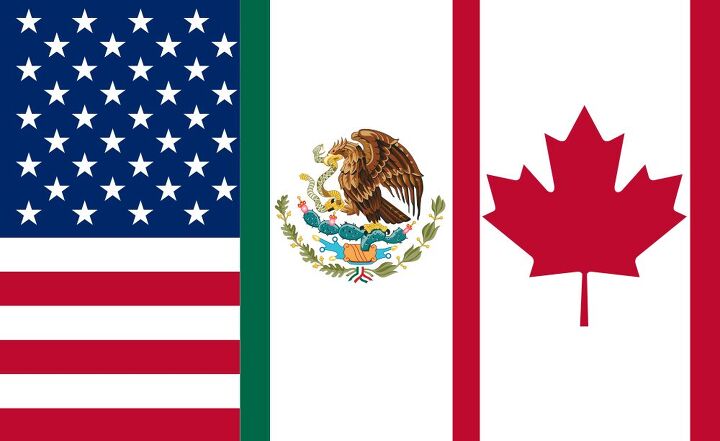Three's Company, Too? Canada Returning to NAFTA Dance As U.S. and Mexico Approach Auto Deal

Canada says it could rejoin the NAFTA discussion, just as the United States and Mexico approach an agreement on automobiles. The two nations engaged in bilateral negotiations a little less than a month ago, seemingly making positive headway on a trade deal.
With President-elect Andrés Manuel López Obrador assuming office in December, it’s in the United States’ best interest to close a deal as soon as possible. It’s assumed the man, frequently referred to as “AMLO,” will make sweeping changes to the Mexican government. However, he also promises to join forces with several smaller parties from both the right and left to create a coalition aimed at rooting out corruption. The resulting level of uncertainty has many fearing difficult Mexican policy changes and trade negotiations in the future, effectively forcing a restart of NAFTA talks.
According to David MacNaughton, Canada’s ambassador to the U.S., the duo are close to finalizing a deal on automotive manufacturing. If so, the Northern nation is prepared to rejoin negotiations.
“If they can resolve their differences on [automotive trade], then I think we can move ahead and have the three of us talk about some of the other issues that affect all of us,” MacNaughton said in an interview with Bloomberg on Thursday.
When asked if he felt positive about future NAFTA negotiations, the ambassador answered in the affirmative.
“I think so,” he said. “We’ve had a number of stops and starts to the negotiation — the most recent being sort of the end of April and early May when I think we came reasonably close to getting an agreement. But then the Mexican election was looming and we sort of agreed to wait until after that. I think the Mexicans and Americans have been talking principally about the auto rules of origin, and things like that where I think we’re pretty aligned with the Americans on the approach to it.”
Despite being in sync with the United States for the most part on automotive matters, Canada still opposes proposals for a sunset clause on the agreement — which would allow a country to quit the North American Free Trade Agreement after five years — and still wants an independent dispute-resolution process. Meanwhile, negotiators for the U.S. and Mexico are ironing out details surrounding regional content requirements for vehicles and a handful of other matters. A final proposal is expected to go public soon.
While the ticking lock element isn’t ideal and nothing has been officially agreed upon, this is probably the most promising update on NAFTA we’ve heard in months.
[Image: NAFTA Secretariat]

A staunch consumer advocate tracking industry trends and regulation. Before joining TTAC, Matt spent a decade working for marketing and research firms based in NYC. Clients included several of the world’s largest automakers, global tire brands, and aftermarket part suppliers. Dissatisfied with the corporate world and resentful of having to wear suits everyday, he pivoted to writing about cars. Since then, that man has become an ardent supporter of the right-to-repair movement, been interviewed on the auto industry by national radio broadcasts, driven more rental cars than anyone ever should, participated in amateur rallying events, and received the requisite minimum training as sanctioned by the SCCA. Handy with a wrench, Matt grew up surrounded by Detroit auto workers and managed to get a pizza delivery job before he was legally eligible. He later found himself driving box trucks through Manhattan, guaranteeing future sympathy for actual truckers. He continues to conduct research pertaining to the automotive sector as an independent contractor and has since moved back to his native Michigan, closer to where the cars are born. A contrarian, Matt claims to prefer understeer — stating that front and all-wheel drive vehicles cater best to his driving style.
More by Matt Posky
Latest Car Reviews
Read moreLatest Product Reviews
Read moreRecent Comments
- ToolGuy I do like the fuel economy of a 6-cylinder engine. 😉
- Carson D I'd go with the RAV4. It will last forever, and someone will pay you for it if you ever lose your survival instincts.
- THX1136 A less expensive EV would make it more attractive. For the record, I've never purchased a brand new vehicle as I have never been able to afford anything but used. I think the same would apply to an EV. I also tend to keep a vehicle way longer than most folks do - 10+ years. If there was a more affordable one right now then other things come to bear. There are currently no chargers in my immediate area (town of 16K). I don't know if I can afford to install the necessary electrical service to put one in my car port right now either. Other than all that, I would want to buy what I like from a cosmetic standpoint. That would be a Charger EV which, right now, doesn't exist and I couldn't afford anyway. I would not buy an EV just to be buying an EV. Nothing against them either. Most of my constraints are purely financial being 71 with a disabled wife and on a fixed income.
- ToolGuy Two more thoughts, ok three:a) Will this affordable EV have expressive C/D pillars, detailing on the rocker panels and many many things happening around the headlamps? Asking for a friend.b) Will this affordable EV have interior soft touch plastics and materials lifted directly from a European luxury sedan? Because if it does not, the automotive journalists are going to mention it and that will definitely spoil my purchase decision.c) Whatever the nominal range is, I need it to be 2 miles more, otherwise no deal. (+2 rule is iterative)
- Zerofoo No.My wife has worked from home for a decade and I have worked from home post-covid. My commute is a drive back and forth to the airport a few times a year. My every-day predictable commute has gone away and so has my need for a charge at home commuter car.During my most recent trip I rented a PHEV. Avis didn't bother to charge it, and my newly renovated hotel does not have chargers on the property. I'm not sure why rental fleet buyers buy plug-in vehicles.Charging infrastructure is a chicken and egg problem that will not be solved any time soon.


































Comments
Join the conversation
Most real Americans are hoping NAFTA goes in the trash heap.
The original Canada-US Free Trade Agreement was initiated by the USA and 'foisted' on Canada by Mulroney's friendship with Reagan. The net result was as predicted a large number of Canadian companies being bought up by multi-nationals, while some manufacturing moved south. Once Mexico was brought in to form NAFTA, again being introduced by the USA and their politicians who were bought/owned by multinational organizations and banks, an increased, if not dangerous amount of manufacturing transferred to Mexico. Mexico being a 'failed' state with no rule of law, but with the extremely low labour rates that global corporations lust after. Including Mexico did not open up a new market to goods from Canada and the USA, instead it just allowed corporations to move to a low wage environment. And with reduced restraints, many of those companies moved their 'head office' to low tax nations/tax havens so that they pay ever decreasing amounts of tax in the nations where their goods are actually sold. Trickle down economics was a crime committed on the populations of Canada and the USA, by corrupt or obtuse politicians.